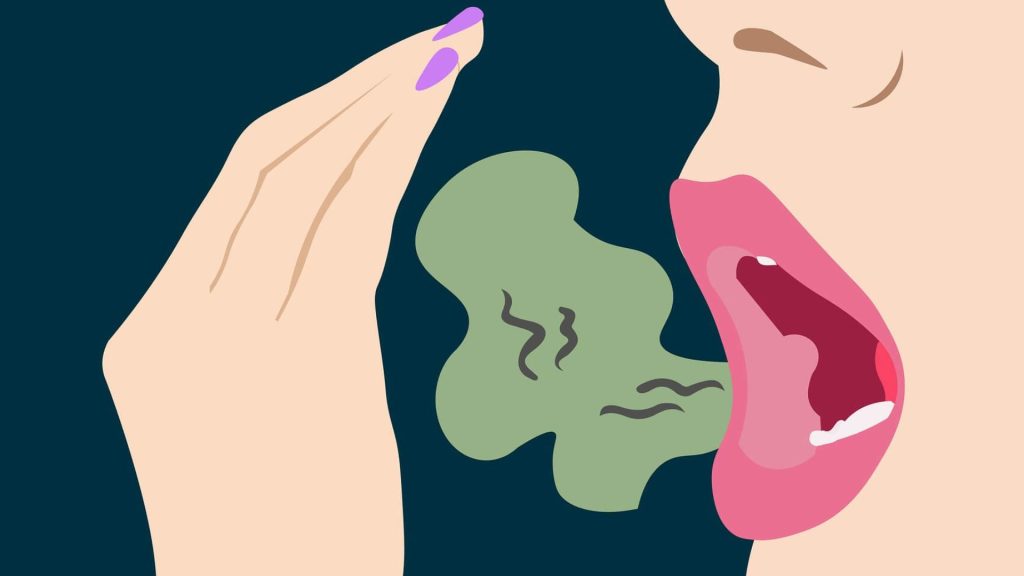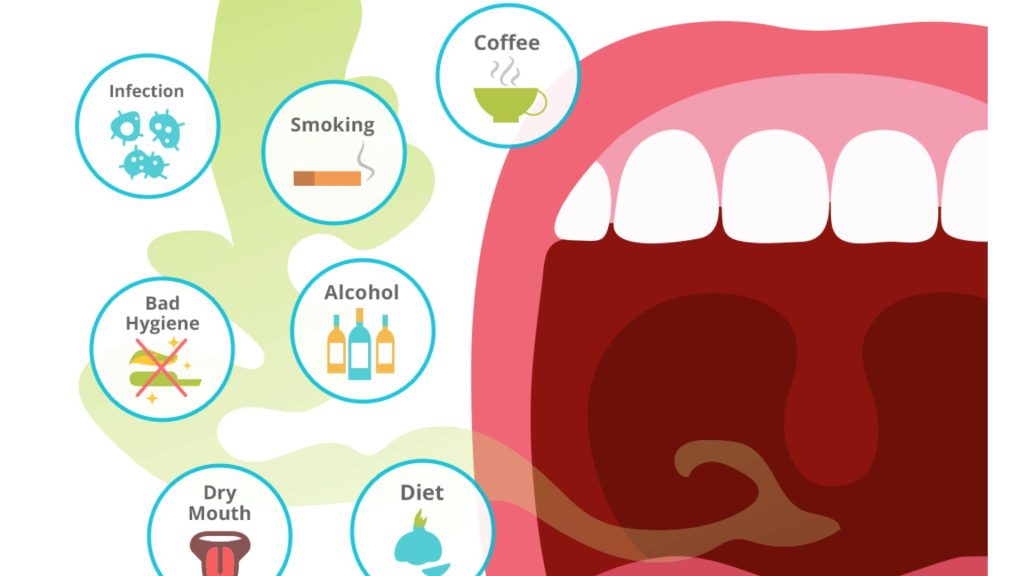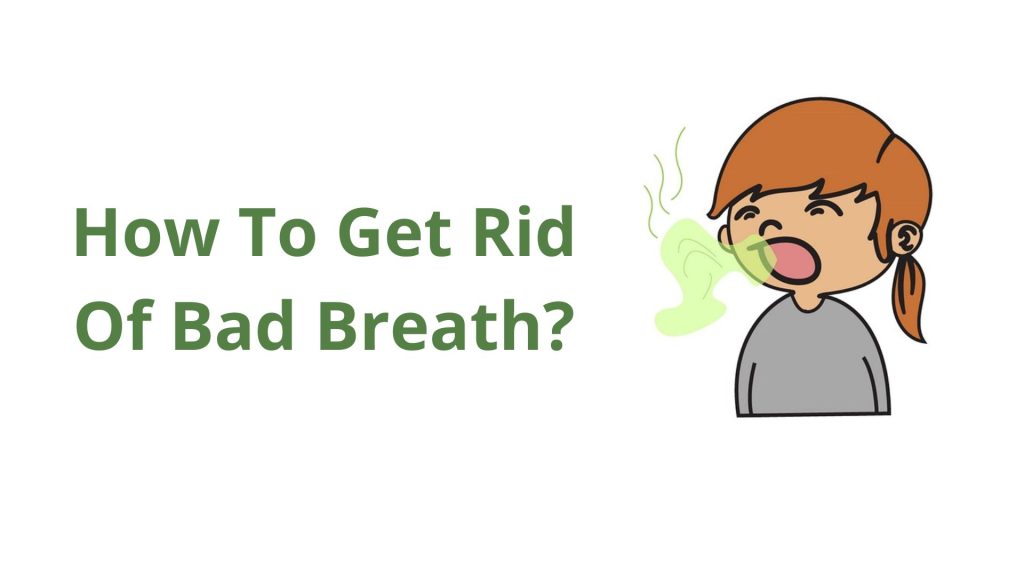How to get rid of bad breath? This is a common line of thought among those who have just discovered they suffer from bad breath. Bad breath may humiliate and lower confidence, therefore it’s crucial to know how to treat it. Poor oral hygiene, certain meals, and underlying medical issues may cause foul breath. In this post, we will discuss some practical strategies for eliminating bad breath and enhancing dental health.
About Bad Breath


Having bad breath means your breath has an unpleasant odor and is not fresh. This is a widespread issue, and it’s frustrating for everyone. An unhealthy diet, digestive issues, dental issues, and neglecting to brush and floss regularly may contribute to chronic bad breath.
However, with common sense solutions and routine dental care, this issue may be solved. You’ll gain self-assurance in social interactions and do your body a favor by fixing your foul breath.
Reasons Why Your Breath Smells


All of us desire fresh breath and the confidence to speak without smells. That’s not always doable. Bad breath is a typical issue that makes individuals feel uncomfortable and lose trust in conversation. Don’t worry—bad breath has several causes, and we can entirely eradicate it. Find out below how to improve your breath and confidence!
Tooth Decay Creates Bad Breath
When paired with gum disease, tooth decay is one of the most common reasons for a foul breath odor. According to a Dental Research Journal research, tooth decay may cause plaque and mucus in the mouth, which stinks. In the mouth, bacteria feed off of food remnants to produce plaque and mucus.
These bacteria create foul-smelling compounds including unsaturated organic debris and hazardous gases like hydrogen sulfide as they break down food. Inhaling these drugs will produce bad breath and low confidence.
Therefore, proper oral care and prompt dental treatment are essential to eradicate cavity-related bad breath. Keep your breath fresh and your self-esteem high by seeing the dentist often if you’ve had dental decay.
Trench Mouth Odors
Bad breath is often caused by gingivitis or trench mouth.
According to a Journal of Clinical Periodontology research, trench mouth is a bacterial gum disease that produces bleeding gums, burning discomfort, and poor breath. If you have a trench mouth, bacteria in your mouth will eat away at the delicate tissues there, resulting in sores and bleeding gums.
Plaque and mucus build up in the mouth cavity, generating odor. Gingivitis untreated may cause tooth loss and other gum disorders.
White Tongue
Some people who suffer from chronic foul breath have white tongues. Proper and regular oral hygiene is crucial in reducing instances of foul breath and a white tongue. Also, A little toothbrush or tongue brush may be used to clean the tongue. Antibacterial mouthwashes minimize oral bacteria and smell. If your white tongue and foul breath persist despite your best home care efforts, it’s time to schedule an appointment with your dentist.
Indigestion
Recent research published in the Journal of Oral and Maxillofacial Surgery links foul breath to digestive issues such as indigestion and acid reflux. Unpleasant scents may be produced by microorganisms in the mouth cavity when food is not completely digested.
Eating Habit
Bad breath might also result from poor dietary habits. Foods that have strong scents, such as garlic, onions, tomatoes, red meats, shellfish, alcohol, sweets, etc., include organic and chemical substances that may be absorbed by the body. body, linger in the digestive tract, and release foul smells. The Russian Medical Journal reported that poor diets can induce foul breath. Low-protein eaters may lack digestive enzymes, producing digestive issues and poor breath.
Smoking
When tobacco is burnt, substances that impact the oral and respiratory systems generate foul breath. Tobacco’s nicotine and tar may cause poor breath and other oral health issues Another research in Tobacco Control found that smoking produces dry mouth and reduced saliva production, which may contribute to poor breath. Also, smoking promotes periodontal disease and gingivitis, which may lead to poor breath.
How To Get Rid Of Bad Breath?


If your breath stinks, it won’t matter how attractive or well-dressed you are. But, don’t worry. The items recommended in this article for combating bad breath are safe and simple to obtain:
Drink Water
Drinking enough water is one of the simple and effective ways to avoid bad breath. The mouth’s germs grow stronger and produce foul smells when the body is dehydrated. Drinking adequate water increases saliva production, which cleans the mouth and removes food particles and germs that cause foul breath. Also, drinking water prevents dry mouth, which produces poor breath. However, it is important to avoid drinking too much water at one time, as it can cause discomfort and affect digestion.
Avoid Stress
Both stress and anxiety have been linked to bad breath. Overproducing the stress hormone cortisol and stomach acid both contribute to an unpleasant odor emanating from your mouth and throat when you’re anxious. So, avoiding stress and finding ways to reduce stress can help you reduce bad breath. Many people find relief from stress via physical activity, yoga, deep breathing exercises, meditation, or by reaching out for support from friends, family, or a professional.
Oral Antibiotics
One technique to prevent and cure bad breath is using oral anti-bacterial. Lozenges, sprays, and mouthwashes all exist as antibacterial options. They remove smells by killing and reducing oral bacteria. Oral antimicrobials recommended:
- Chlorhexidine: It is a powerful antibacterial agent that can reduce the growth of bacteria in the mouth. Chlorhexidine comes as mouthwash, lozenges, and sprays.
- Cetylpyridinium chloride: It kills microorganisms and improves breath. Sprays and mouthwashes include cetylpyridinium chloride.
- Zinc: It fights oral microorganisms. Zinc lozenges and sprays are widespread.
But, before taking any anti-bacterial medication, consult with your dentist or doctor to make sure it’s safe and won’t harm you.
Rinse With Saltwater
Saltwater has an effective antiseptic and antibacterial effect. Regular use not only helps to eliminate bad breath rapidly but also reduces the risk of gum disease. Mix salt water moderately (not too light, not too salty) and suck and gargle twice a day. Also, you may gargle with Epsom salt (magnesium sulfate), which has antibacterial characteristics and helps to eliminate foul breath in the mouth. After brushing, rinse with a teaspoon of Epsom salt in 100 ml of warm water.
Baking Soda Toothpaste
Baking soda’s bleaching abilities aid in sanitizing the mouth and getting rid of foul breath. Combine a tiny quantity of baking soda with water to make a paste, and then use it to clean your teeth. This bad breath remedy not only helps freshen your breath but also helps whiter teeth. However, you should only apply 1-2 times per week because doing too much will erode tooth enamel.
Tea Tree Oil Toothpaste
Since tea tree oil is antibacterial, it may be used to kill the germs in your mouth that are responsible for foul breath. The soothing aroma of cajeput essential oil freshens your breath. It’s safe and accessible. To achieve the greatest results, add 1 drop of cajeput essential oil to your toothpaste, brush your teeth for 2–5 minutes twice a day, morning and night, and rinse with warm water.
Use Guava Leaves
According to Oriental medicine, guava leaves have a bitter taste, are warm, and have a detoxifying effect. Modern science proves that young guava leaves have 7-10% tannins – antibacterial substances that are highly effective in treating bad breath. In addition to tannins, guava leaves also contain oxalic and phosphoric substances that work to whiten teeth, remove plaque and effectively eliminate bad breath. Leaves and young tops of guava leaves are washed, crushed, then put in a pot, add boiled water, add a teaspoon of salt and stir well. Use this water to rinse your mouth daily, you will see a significant improvement in bad breath.
Seeing A Doctor
Bad breath may be caused by a number of medical issues, including diabetes, periodontal disease, gingivitis, pharyngitis, and stomach reflux. Therefore, if you are suffering from these health issues, consult a doctor immediately and start treatment so that you don’t end up with foul breath. Also, heart medicines, antibiotics, and sedatives may produce foul breath too. Thus, if you suspect that your medication is the cause of your bad breath, discuss it with your doctor to look for alternatives.
Conclusion


7 easy strategies are provided here for fighting bad breath and keeping it fresh. However, the aforementioned solutions are not always effective in eliminating foul breath. Sometimes, the cause of bad breath can be related to your health condition. Thus, health checks and treatment are crucial. Bad breath may be a problem, but at Spring Orchid Dental Clinic in Bassendean, both skilled dentists and cutting-edge technology can help you find and address any underlying causes. For healthy teeth and fresh breath, Spring Orchid Clinic recommends frequent dental checkups and treatment. Book an appointment today!
FAQs
What can I Do To Reduce The Effects Of My Drugs On My Breathing?
Talk to your doctor right away if prescription side effects are making it hard for you to breathe. They may be able to modify your medicine or suggest alternatives that do not exacerbate your breathing problems. Meanwhile, you may take these measures to lessen the impact on your breathing:
- Until you know how the drug affects your breathing, it’s best to avoid activities that call for heavy breathing or physical activity.
- Doing deep breathing exercises might help you breathe better and strengthen your lungs.
- If you have respiratory issues, you should avoid smoking and being around others who smoke.
In sum, before making any changes to your prescription or treatment plan, be sure to talk to your doctor.
What Foods Minimize Bad Breath?
Foods that decrease foul breath include:
- Fresh vegetables and fruits: Antioxidants and fiber in vegetables increase saliva flow, cleaning the mouth and preventing bad breath.
- Yogurt: Digestive bacteria in yogurt reduce foul breath bacteria.
- Smoking honey: Saliva helps clean the mouth and reduce foul breath.
- Green Tea: Antioxidants and antibacterial compounds in green tea clean the mouth and reduce foul breath-causing microorganisms.
So, if you have severe foul breath, see a dentist for effective treatment.
Why Don’t Mouthwashes Help Your Bad Breath?
While using mouthwash can provide temporary relief from bad breath, it’s not 100% effective in all cases. Bad breath may be caused by numerous things, including germs in the mouth, gingivitis, dyspepsia, and eating habits. These solutions may help:
- Check and treat dental issues including gingivitis, tooth decay, and more at the dentist.
- Brushing and flossing after meals improves oral hygiene.
- Avoid strong-smelling meals like garlic, onions, and tomatoes, and eat enough nutrients.
- Stay hydrated and calm to prevent foul breath.
- Xylitol-containing mouthwashes kill bad-breath germs.
- If the following treatments fail, visit your doctor for more specific advice.
Thus, eliminating bad breath requires more than just mouthwash.





